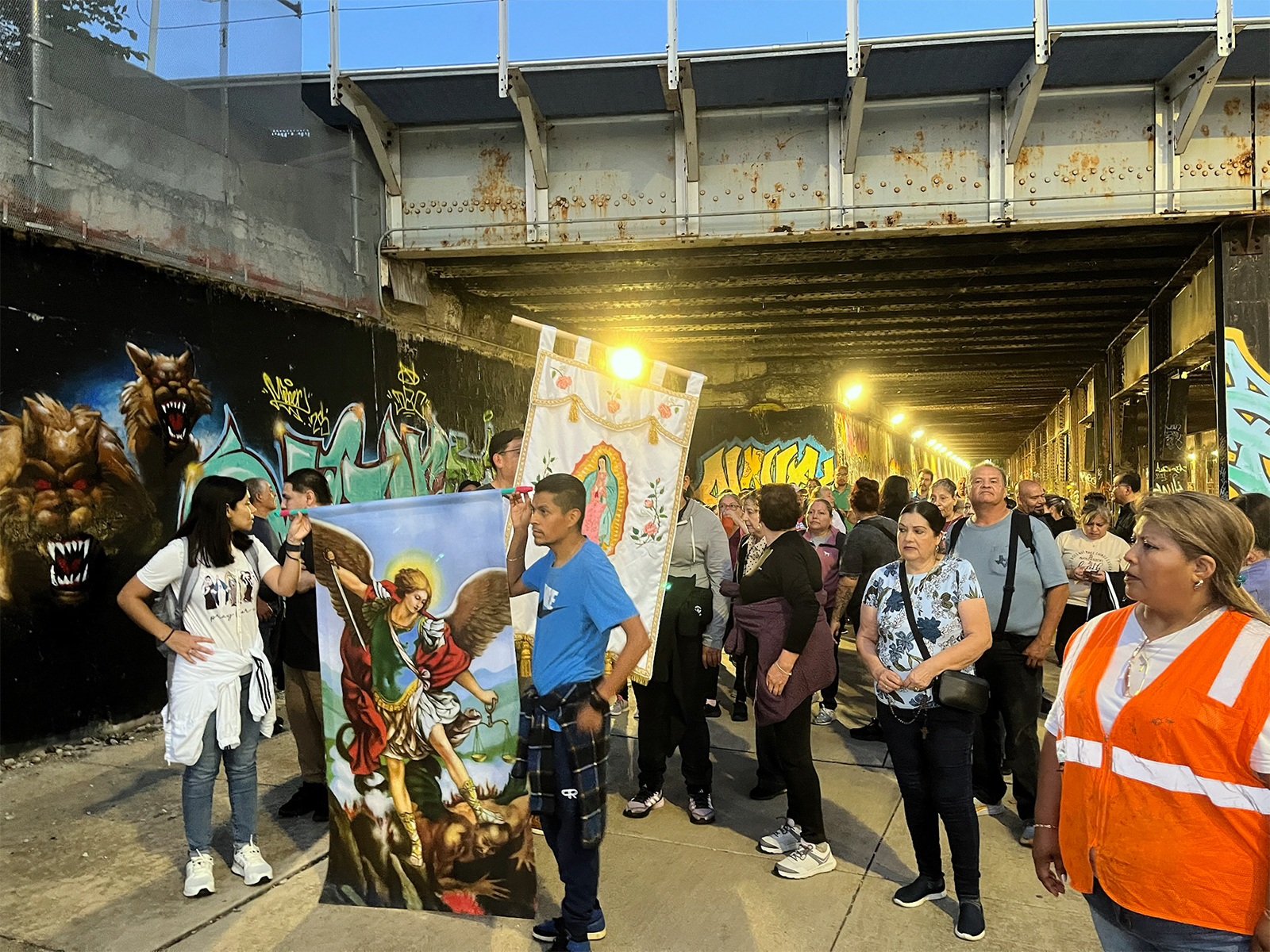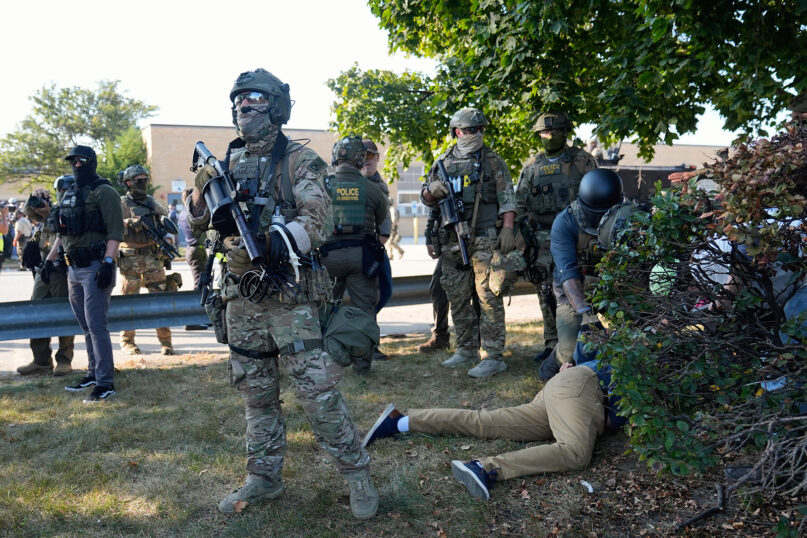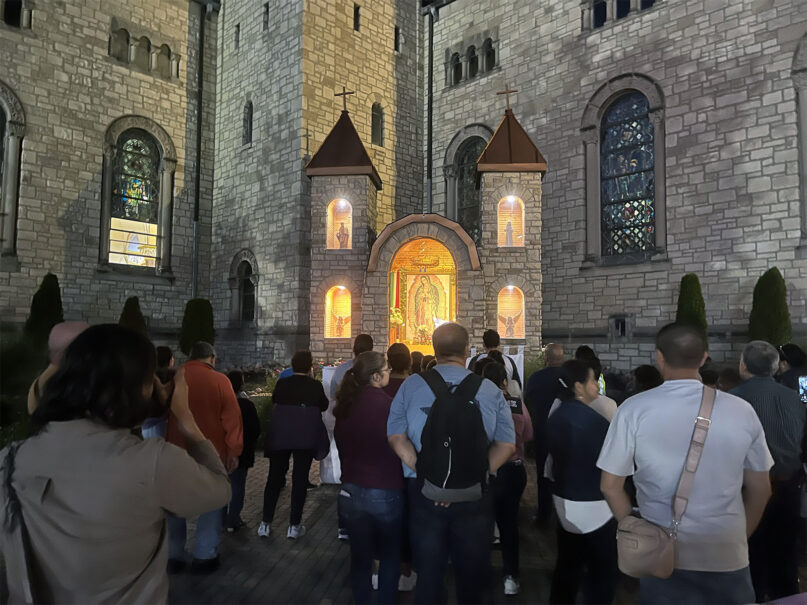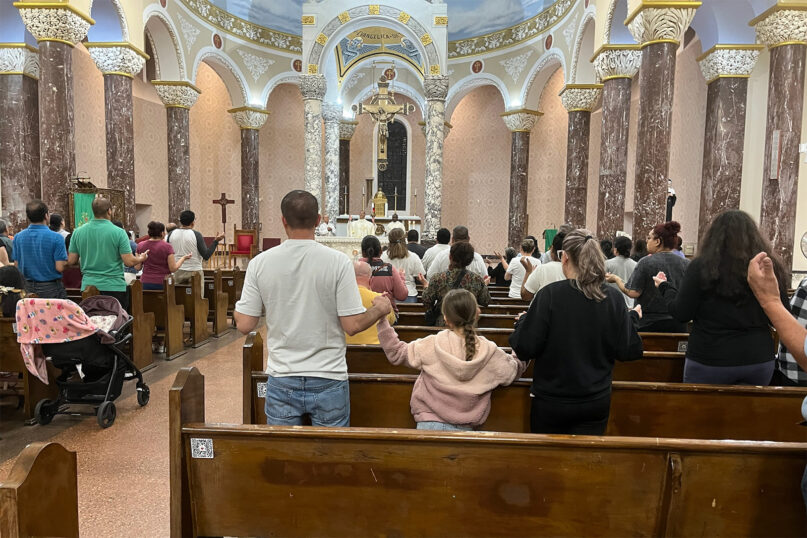
CHICAGO (RNS and NPR) — For three Guatemalan roofers, there has only been one place they have found community in the six years since the first one arrived here — Catholic Mass. As one of the three men, the most talkative of the Mayan language Q’eqchi’-speaking group, put it, “We don’t know anybody other than the parish here.”
But the three roofers, all relatives from the same small town in Guatemala and who now live and work together in Chicago, decided about two months ago they couldn’t risk going to Mass anymore.
“We decided to stay home, go to work and rest, and on Sundays it’s better to stay at home, because we have these dreams,” the talkative man, who came to Chicago two years ago, told NPR and RNS in Spanish. Dreams, he said, of making sure his daughter back in Guatemala gets a good education and of buying land. But there aren’t job opportunities in Guatemala, he added.
The three men, who don’t have legal immigration status, and other members of their parish agreed to speak with reporters on the condition that their names and their parish not be identified. The fear of being deported or of the church being targeted by an immigration raid has become intense. An immigrant leader at their parish said attendance at Spanish Masses has now dropped by 45%, part of an increasing decline throughout the fall.
The Department of Homeland Security says it has carried out more than 3,000 arrests since it announced on Sept. 8 Operation Midway Blitz targeting Chicago, part of the Trump administration’s efforts to carry out mass deportations.

Law enforcement detains a protester near an Immigration and Customs Enforcement facility in Broadview, Ill., Oct. 3, 2025. (AP Photo/Erin Hooley)
The campaign — which has garnered national media attention for immigration agents who have released tear gas in residential neighborhoods, targeted street vendors and gig workers and shot protesting clergy with pepper balls — has led many immigrants to change their daily routines. Some, like the Guatemalan relatives, have made the emotionally fraught decision to give up church attendance.
But staying away from Mass is no small thing for the men. Last year, they were in a severe car accident on the way to work. One of them broke his leg, and another broke his knee and spine. They are also grieving one of the men’s brothers, who died in the accident.
As they were stuck in bed recovering from their injuries, the volunteer director of the parish’s migration ministry found resources to cover their rent and living expenses.
“When we needed it most, they helped us a lot,” said the Guatemalan man. And they didn’t just receive practical help — women from the church came and prayed the rosary with them, making sure they didn’t feel “alone” or like they were “without anybody.”
Going to Mass in Spanish feels like they’re back in their small town, he said. The loss of that community, especially as they continue to grieve, “hits close to your heart,” the Guatemalan man said. “It feels horrible.”
As they’ve traded looking forward to Sunday Mass for the uncertainty and fear of wondering what the next day will bring, the men have stayed in touch with the immigration ministry director who made sure they were taken care of after their accident.
The volunteer, who also lacks legal status, said he came to the U.S. fleeing death threats in Veracruz, Mexico, 28 years ago. He’s still going to Mass, combining the outing with the weekly grocery shopping, but, about a month ago, his wife decided she couldn’t risk it anymore.
The parish is just blocks from one of the many sites where immigration agents deployed tear gas, and the volunteer said he has twice seen immigration agents in his limited trips outside the house. After watching from down the street as the agents pulled people from their cars at a red light, he now tries to drive without hitting the red lights.
“Many of us are afraid to go to work, to go to a restaurant, to go to church because everyone, everybody is afraid of encountering ICE and perhaps being deported to another country,” the volunteer said in Spanish.
Nevertheless, the volunteer comes home from an eight- to 10-hour shift operating machinery at the metal shelf factory to man his cellphone for hours and try to help find support for immigrants too afraid to work. One family he has visited has been hiding in their basement for three months, only coming upstairs to cook.

Catholics pray outside of St. Rita of Cascia Catholic Church following a three-mile pilgrimage on Chicago’s South Side, Wed., Sept. 24, 2025. (RNS photo/Aleja Hertzler-McCain)
He says he’s following his ancestors in helping others. “I think they’re happy watching me continue to do what they did,” he said.
Chicago Cardinal Blase Cupich told NPR and RNS society’s decision-makers need to take action to fix the current immigration crisis in the U.S. “We have failed, and our legislators on both sides of the aisle have failed to enact comprehensive immigration reform.”
A senior Department of Homeland Security official said in a statement to NPR and RNS that agents use discretion when enforcing immigration law at houses of worship. “Officers would need secondary supervisor approval before any action can be taken in locations such as a church. We expect these to be extremely rare,” they said.
At the South Side parish of St. Oscar Romero, the Rev. Jose Del Carmen Mendez, the pastor, said Mass attendance was down about 40% at the church since the administration’s campaign began.
“We give them the opportunity to come to church, but if they don’t feel comfortable, I believe God understands their concerns and their fears, and that’s very personal for them to deal with,” Mendez said.
The largely Latino church dedicated its Sept. 24 three-mile Jubilee pilgrimage to praying for migrants. As he walked toward the Jubilee site at St. Rita of Cascia, which parishioners visited to seek a plenary indulgence — a blessing that removes punishment for sins — Mendez told RNS and NPR “there is no way that we can impose the obligation of going to church because of their fears.”

People attend Mass at St. Rita of Cascia Catholic Church after a three-mile Jubilee pilgrimage to pray for migrants, Wed., Sept. 24, 2025, in Chicago. (RNS photo/Aleja Hertzler-McCain)
At the Spanish Mass following the pilgrimage, Mendez preached that God loves everyone equally. He said that just as Catholics sought freedom from their sins during this Jubilee year, themed “Pilgrims of Hope,” immigrants hope for a dignified life where they are not unjustly judged as criminals.
“May God Almighty, Jesus the Immigrant, Mary of the Journey, inspire us to recognize that we are only passing through here,” he said. “No matter where you were born, no matter when you migrated, our citizenship is not here, but in the presence of the Lord.”
Church attendance started to decline at a different parish in Chicago’s north suburbs right after Trump’s inauguration. Although Mass attendance there had picked back up, a parish deacon said the surge of immigration agents in the city has again made attendance drop — it’s now down 20%-25%.
The deacon is trying to minister to people while they stay at home by dropping groceries off at their homes a few days a week. His church also started a Zoom ministry for people to meet and pray the rosary. Once a week, the parish conducts a 12-hour prayer vigil for people impacted by the immigration raids.
As for people who are still going to Mass, the deacon said, “People watch outside the parking lot in the street, if they see any movement or any immigration officer. Also they do the routine walking in the street to protect our community.”
Back at the first parish, others are strategically adjusting their Mass attendance. A woman whose adult children have been begging her to stay home from Mass was determined to continue attending daily Mass.
“I told them they weren’t going to take that away from me,” the woman, who came to Chicago from Guatemala 38 years ago, said in Spanish.
She calls it her “second home” and volunteers with many ministries, including washing linens used during services. She tells the priest, “Whatever my hands can do to serve God and you, I’m always here when I can.”
But with the growing presence of immigration agents, she has decreased her attendance to Sunday and most Friday Masses at her parish.
The grandmother of two and mother of three wants her kids to trust that God will keep her and their father safe despite the increased deportations in the area.
“I tell them that’s not going to happen,” she said. “God is with us. Go to church more. Seek God so that you may feel more comforted by him.”
God has been her strength through surviving cancer and losing her house, she said.
But despite her confidence, sometimes doubt slips in, like when she can’t go back to sleep when her husband leaves for work and she prays for him until she hears he’s arrived.
She said it is important for her not to show any weakness because she doesn’t want her kids to be weak.
But at the thought of being separated from her children, she began to tear up. “I don’t think I could endure that. I’ve endured a lot that has happened to me because I say my God has given me strength,” she said. “But they don’t have the strength I have, and maybe not the faith.”
Even after seeing seven immigration lawyers who have failed to help them adjust their status, she and her husband are continuing to look for someone to help them stay in Chicago.
Chicago is where they’ve raised their kids, experienced some of their worst trials and come out on the other side. “It’s true that my land is where I was born, but I love this land, too,” she said.
This story was produced through a collaboration between NPR and RNS. Listen to the radio version of the story.
